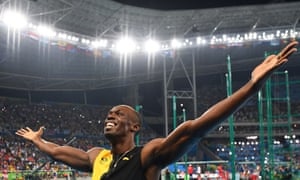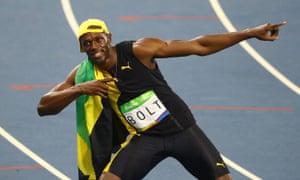- Jamaican becomes first athlete to win three successive 100m titles
- American Gatlin comes in second with Andre De Grasse of Canada third
 |
| Jamaica’s Usain Bolt celebrates after he won the men’s 100m final. Photograph: Franck Fife/AFP/Getty Images |
“Bolt! Bolt! Bolt!” they cried, feverishly and repeatedly, revelling
in Usain Bolt’s every pose, wave and smile. And, most of all, in his
victory. The Jamaican had promised the world he would create history in
Rio and he proved good to his word, brushing past his great American
rival Justin Gatlin with 25m to go to coast to become the first man to
win three Olympic 100m titles.
The time was nothing special – 9.81 seconds – but at this stage of
his career he knows scavenging for titles is more realistic than world
record times. This win lifted Bolt above Carl Lewis – who won 100m gold
in Los Angeles and Seoul – and he now has seven gold medals to his name.
On this evidence only a brave man would back against him making that
nine after the 200m and 4x100m relay later this week.
 |
| ‘It wasn’t a perfect race, but the fact is that I won,’ said Usain Bolt after his third 100m victory in succession at the Olympics. Photograph: Amin Mohammad Jamali/Getty Images |
Behind Bolt trailed Gatlin, his great rival, who took silver again in
9.89. The best of the next generation, the Canadian Andre De Grasse,
claimed bronze in 9.91.
This was Bolt’s slowest championship winning time, a far cry when he
raced away from the field to set an Olympic record of 9.63 sec in London
four years ago. It is part of a gradual slowing down and he winds
towards retirement next year. At the world championships in Moscow in
2013 he had run 9.77, in Beijing last year 9.79. Simultaneously he
appears increasingly mortal yet still far beyond the reach of his
contemporaries.
“I’m really happy but I expected to go faster,” Bolt admitted. “With
the turnaround time between the semi-final and final we normally have
two hours, but we had one hour 20 minutes, it was challenging. But I’m
just happy that I won and that’s the key thing.”
Before the start the athletes were introduced one by one, to a rasping techno beat and mostly rapturous cheers. This was the biggest moment in most of their careers. Understandably most looked pensive. Not Bolt. Sometimes you almost believe he could look relaxed in front of a firing squad. No doubt he would bet on himself to outrun their bullets. Gatlin, predictably, was booed – his reputation for failed drugs tests having proceeded him. Afterwards even Bolt admitted he found that “shocking”.
But the crowd’s reaction didn’t seem to affect Gatlin. And for the briefest moment after the gun sounded, it appeared that the American might just have the run on the field. Even at 34 the American’s start remains a work of technical beauty: his body synchronised in perfect time to the starter’s pistol. He was out of his blocks quickest and headed the field by at least a metre at halfway. Bolt, by contrast, did not so much explode from blocks as rise stiffly from them: like a man with a slipped disc getting upright after a sleeping on an overly hard mattress.
But once he got into his stride it was over. Gatlin has not looked quite the same this year, age and a troublesome ankle injury having blunted his finishing speed. From 60 to 70m Bolt caught up with him and then rapidly slit his ambitions. As Bolt crossed the line he was slowing down, hand across his chest in salute.
Even now, despite all track and field’s deep-scented musk of scandal and suspicions, the men’s Olympic 100m final can still stop the world – while being the fastest man on the planet carries bragging rights. And once again, Bolt can rightfully holler the loudest of all.


0 comments:
Post a Comment
PLEASE BE POLITE